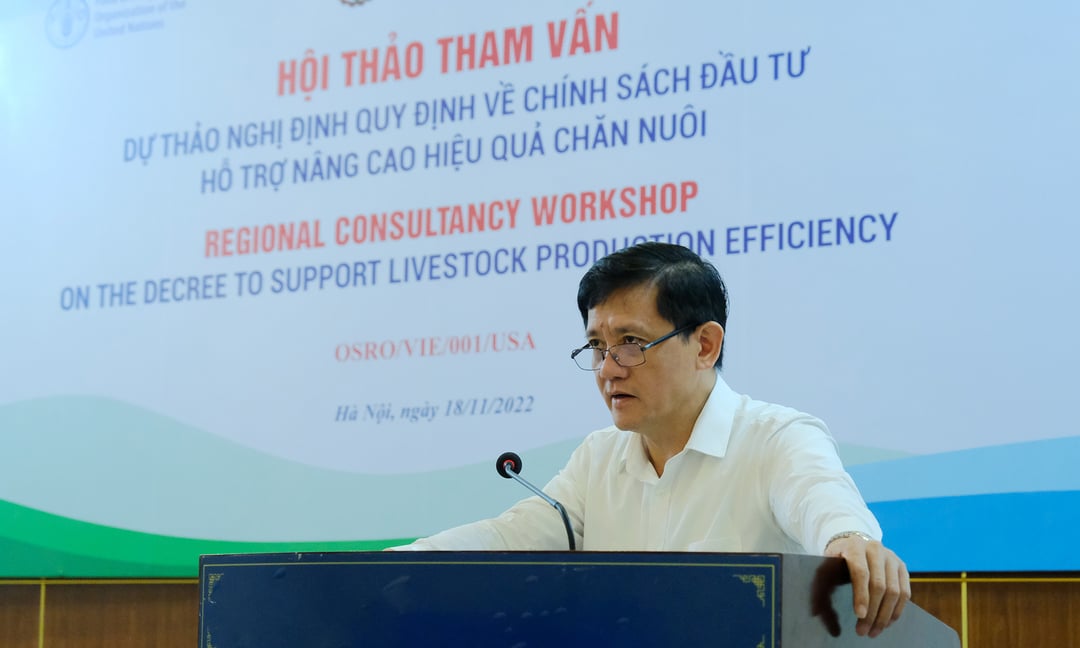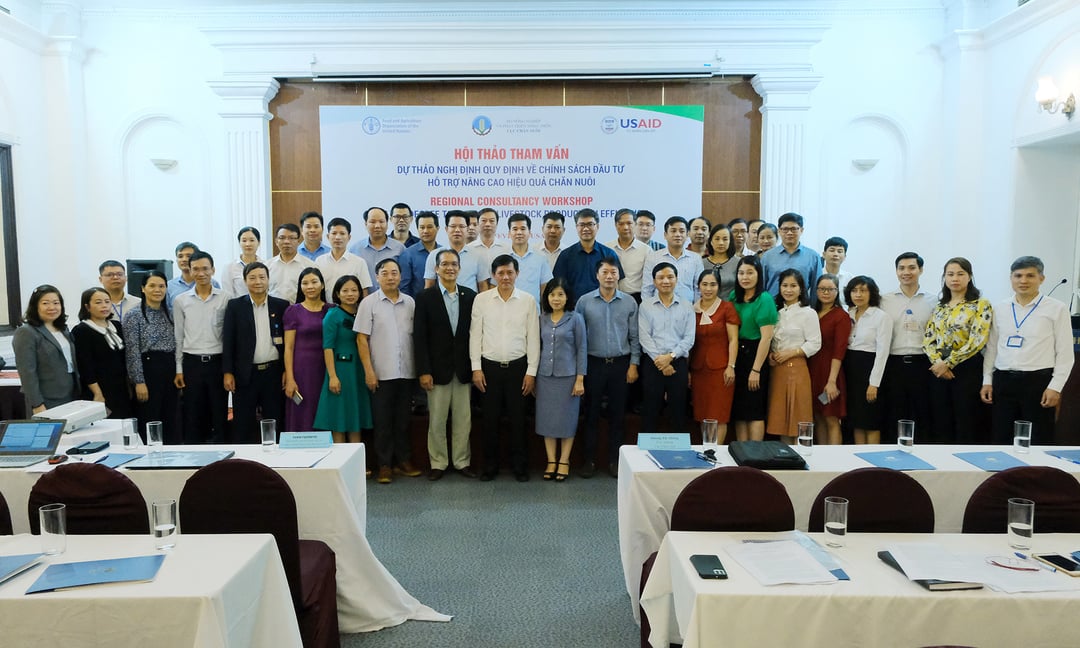June 17, 2025 | 17:04 GMT +7
June 17, 2025 | 17:04 GMT +7
Hotline: 0913.378.918
June 17, 2025 | 17:04 GMT +7
Hotline: 0913.378.918

Mr. Duong Tat Thang, Director of the Department of Livestock Production, expects the new Decree will remove 7 challenges. Photo: Bao Thang.
At the Consultation Workshop on the Draft Decree on investment policies to support raising livestock efficiency, Mr. Duong Tat Thang, Director of the Department of Livestock Production, Ministry of Agriculture and Rural Development, said that the livestock industry had developed stably over the years, contributing to ensuring the livelihoods of nearly 10 million farmers and providing enough meat, eggs, and milk in almost 100 million people and about 17 million tourists annually.
Specifically, from 2010-2021, meat production of all kinds increased 1.7 times (reaching 6.7 million tons), and eggs increased 2.7 times (17.5 billion fruits). Fresh milk increased four times (1 year),2 million tons of milk), and industrial animal feed increased more than two times (reaching 21.5 million tons).
"The livestock industry contributes to the overall growth of the agricultural sector, in performing its role as the backbone of the economy and stabilizing the social situation of the whole country. The quality of livestock products has been increasingly improved, ensuring the growing demand of the domestic and export markets", Mr. Thang said.
Despite remarkable achievements, the livestock industry faces seven challenges, including natural disasters and climate change, infectious diseases, environmental pollution, and lack of land funds for livestock development.
Besides, it is competitive in the quality and price of domestic products with imported goods. The cost of livestock production increased due to inflation and the increase in the price of raw materials for animal feed. The chain link is weak, and the connection between production and the market is still limited.
To advise the Ministry of Agriculture and Rural Development to submit to the Government worthy investment policies, thereby supporting the improvement of livestock production efficiency, on November 18 in Hanoi, the Department of Livestock Production held a workshop to consult experts in the field of livestock production. Countries, localities, management agencies, and associations to issue a new Decree soon.
According to the draft Department of Livestock Production under construction, the Decree includes 5 chapters and 19 articles focusing on two policies: Investment in support for livestock development; Improve livestock efficiency.
Regarding livestock development, the draft decree plans to build an industry database system that supports management agencies and upgrades roads, waste treatment systems, water supply and sanitation equipment.
In addition, cooperative groups, cooperatives, and enterprises with projects to invest in domestic production, processing, storage and consumption facilities are supported to build raw material zones, develop intra-field traffic, and develop irrigation transport systems, land rental costs, or costs of purchasing supplies and raw materials. Wholesale markets and livestock establishments that are relocated from areas where livestock are not allowed are also included in the support.

Delegates in the workshop took a souvenir photos. Photo: Bao Thang.
Regarding raising the efficiency of livestock production, the draft decree supports artificial breeding with buffaloes, cows and pigs, including materials and breeding animals. Also, livestock waste treatment and artificial breeding activities are studied for appropriate support levels.
According to the Department of Livestock Production, if the new decree is approved, farmers will have no problems such as efficiency when exploiting the industry's potential; motivation for farmers to continue to invest in development; solving economic, social and environmental issues synchronously.
Mr. Pawin Padungtod, the Senior Technical Coordinator of FAO Vietnam, said that Vietnam's livestock production still has a lot of fiscal space but faces the risk of diseases such as dermatitis, bird flu, blue ear disease...
By the commitment to accompany and support the livestock industry to develop a system of legal documents, the FAO representative agrees that the state management agency needs constant change and updates, often to create safe and sustainable livestock production.
Mr. Nguyen Thanh Son, Chairman of the Vietnam Poultry Association, was pleased to see that the draft decree mentioned some "bottlenecks" of domestic livestock production. However, because livestock has many decrees and circulars, and the proportion of smallholder farmers is still relatively high, Mr. Son said that the draft decree editing team must consider and choose the right problem instead of the investment spreadly.
At the workshop, the Department of Agriculture and Rural Development and the Sub-Department of Livestock Production and Veterinary Medicine of the Northern provinces expressed their hope that the new decree would not overlap with the current policies and inherit the policies that have brought into full play the effectiveness of in the past. They also hope the decree will create a new, specific, practical, breakthrough mechanism for the livestock industry.
Thanks for the comments, Mr. Duong Tat Thang pledged that the Department of Livestock Production would continue to listen with the spirit of market, openness, sharing and absorption to help the new decree become a boon for the livestock industry.
Translated by Ha Phuc

(VAN) The UNESCO Global Geopark revalidation of Non nuoc Cao Bang and the transition to a two-tier administrative model are presently undergoing a pivotal moment in Cao Bang, the northernmost province of Vietnam.
/2025/06/13/5330-2-004539_953.jpg)
(VAN) Changing policy mindset and removing investment barriers are urgent requirements to open up new development space for enterprises in the agricultural sector.

(VAN) The areas include the restoration of five million hectares of marine ecosystems.

(VAN) Dr. Le Van Nguyen, Director of the Institute of E-Commerce Management (ECM), emphasizes the potential for green development through the cultivation of fruit trees, particularly in provinces such as Son La.

(VAN) VAAS and numerous Vietnamese enterprises have signed cooperation agreements with Japanese partners to promote agricultural technology and trade connectivity.
/2025/05/29/5625-12-214801_567.jpg)
(VAN) Provincial mergers in the Mekong Delta promise to streamline administration, expand inter-provincial raw material areas, and foster close linkages in agricultural value chains, benefiting both businesses and cooperatives.

(VAN) Merging Mekong Delta provinces contributes to the expansion of agricultural raw material areas, addressing previous constraints caused by provincial boundaries. Additionally, this expansion will reduce costs and strengthen linkages between businesses, cooperatives, and farmers.